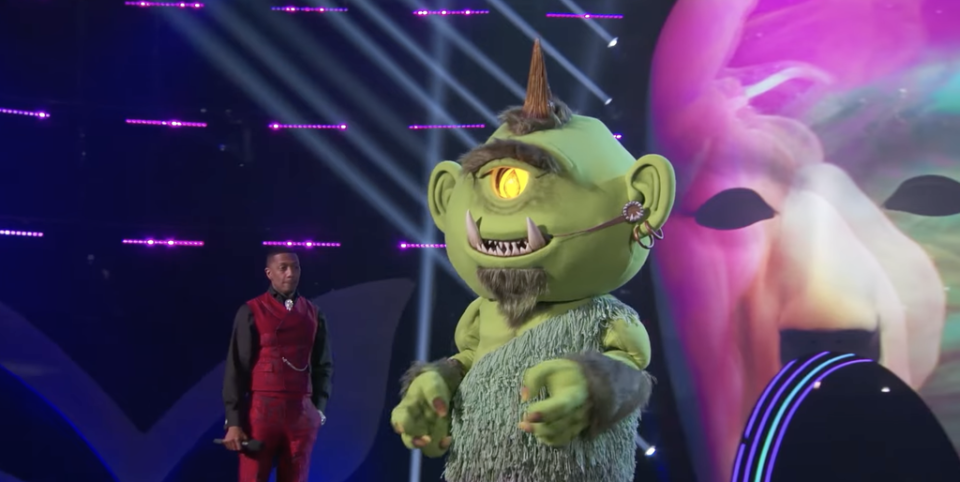As a Gen Zer I don’t recognise any of The Masked Singer ‘celebrities’ - but I’m still in love with it

A talent competition that makes its contestants perform as giant stuffed animals is pretty haunting as concepts go, yet it’s one that has driven FOX’s ratings to new heights. Corny it might be, but I’ve found myself among The Masked Singer’s millions of weekly viewers, attempting to harmonise my way through the hour along with its mystery celebrity vocalists – some of whom are as mediocre at singing as me.
I naively assumed the term celebrity would mean I’d be serenaded by the tender vocals of Billie Eilish or even the powerful timbre of Shakira. Instead, as a card-carrying member of Gen Z (I was born in 1997), I very rarely recognise the weekly contestants, which this season have so far included pastry chef Duff Goldman, sports broadcaster Joe Buck, Philadelphia Eagles footballer Jordan Mailata, actor Jorge Garcia, model Christie Brinkley, magician duo Penn & Teller, Dog the Bounty Hunter Duane Chapman, Broadway actor Jennifer Holliday, and former New York City mayor Rudy Giuliani. But as the season continues, I can see the show for what it is; rather than taking itself too seriously, The Masked Singer’s main aim isn’t megawatt star power but joyful frivolity.
The Masked Singer began life in 2015 as a South Korean variety show and made its US debut in 2019. The set-up is, by now, well-known; contestants dressed in elaborate disguises and voice-altering technology go head-to-head, belting out a pre-prepared song. At the end of the hour, if they haven’t proven themselves a strong enough singer, the audience and a panel of judges vote them off as they simultaneously try to guess their identity, based on clues provided throughout the episode.
The Masked Singer is currently in its seventh US season and we’ve already seen 10 contestants shown the door. Of these, I’ve only known three, Giuliani, Garcia, and Dog the Bounty Hunter. Aside from Mailata – a 25-year-old offensive tackle – the roster is largely comprised of faded Eighties and Nineties celebrities, who are pretty much unknown by me and my friends. Despite the show’s claim that it’s a competition for celebrities, it’s definitely not competing against Coachella’s star-studded lineup, but nor is it trying to. It would be too easy for the series to feature modern icons like Beyonce, Ariana Grande, or Harry Styles. Their voices are simply too recognisable and – perhaps more pertinently – it would be far too expensive.
The panel of judges – Nicole Scherzinger, Jenny McCarthy, Ken Jeong and Robin Thicke – also lack a sort of contemporary vigour. On one end of the table, we have McCarthy, who has aligned herself as an anti-vaxxer, and Thicke, who was accused of sexual assault by Emily Ratajkowski on the set of his 2013 hit “Blurred Lines”. On the other end is Scherzinger, whose career peaked well over a decade ago as the lead singer of The Pussycat Dolls, and The Hangover actor Jeong, who is probably the most relevant, thanks to his role in the critically acclaimed 2018 film Crazy Rich Asians.

However, what the show lacks in massive names it makes up for in incredible production values. At the start of each episode, the screen is consumed by flashing lights, making it nearly impossible to change the channel. Host Nick Cannon makes his entrance on a Game of Thrones-esque chair, accompanied by fake bodyguards. From the spectacularly intricate “clue-mercials” to fog machines and fire effects that accompany the performances, it’s a stage like no other. It’s a giddy escape from your typical singing competition, favouring an hour of absurdity over serious talent.
Of course, it’s not attempting to overtake American Idol, X-Factor, or The Voice. Instead, The Masked Singer isn’t about finding the next Lady Gaga, but about having some fun in the middle of the week. I don’t mind that I don’t recognise half of these “stars” because ultimately, I’m still chanting “Who is that, who is that?” just as loudly as those that do.

 Yahoo News
Yahoo News 